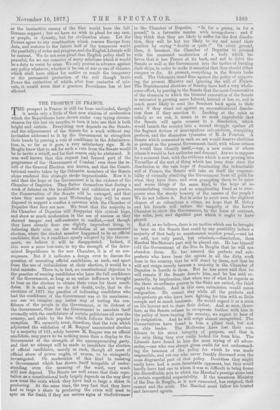TOPICS OF THE DAY.
THE COLLAPSE IN ARMENIA.
ENGLISHMEN have been so accustomed to study despotism in its modern form—despotism in the hands of a Clow always afraid of resistance, always fearful of opinion, and always inclined to act dramatically—that they have almost forgotten of what likeness the old despotisms were. The secure absolutisms of which Austria was once the perfect type, and of which Russia presents the last example left in Europe, were very slow and lumbering machines, presided over by men who took their ease day by day, and thought hurry undignified, and novelty unsafe, and displayed in most matters a certain optimist indifference which had sometimes an astonishing effect in calming things down, and sometimes led to very great calamities. We are by no means sure that this temper was not the main cause of the early Russian disasters in this cam- paign. The Court in Russia is all in all, and the Court took the war as a rich noble takes a great law-suit, as something which must be faced, and is very disagreeable, but will be managed fairly enough by the " usual advisers of the family," Messrs. Slow and Bideawhile. Preparations were made on the usual scale, the usual Generals were left in com- mand, and the usual strategy, the strategy inherited from Suwaroff—who won with it because his opponents had only muskets and round-shot—was considered sufficient. It was not till disaster after disaster had wakened the Imperial Court that the machine was put into active movement at all, but then its great power was rapidly and unmistakably re- vealed. The " usual " men were gently but decisively super- seded, and from the second attack on Plevna the Court has not made a visible mistake. Nothing could be better than the silent rapidity with which the armies, both in Asia and Europe, were reinforced, until the " beaten " Grand Duke Michael suddenly appeared at the head of sixty-five thousand men, and an English observer reports that the regiments destroyed before Plevna have been brought up again to within 150 of their full strength. He counted the men himself. That has been done by mere drafts from the permanent garrison of Russia, which, again, is refilled from the 400,000 purely Russian lads —we omit all Asiatic tribes—who yearly present themselves to the conscription. The slow vacillation visible in Bulgaria was exchanged for rapid action, the enormous strength of the army in cavalry was utilised, and by a series of dashing ex- ploits General Gourko secured the only road by which supplies could reach Osman Pasha ; and Plevna, full of disease—as eye- witnesses report to the Scotsman—but not full of provisions, was closed in upon itself. These successes were achieved with- out weakening the army of the Cesarewitch, always, for dynastic reasons, an object of the first importance, so that it is still strong enough to resist, possibly to defeat utterly, the desperate attack by which Suleiman Pasha must endeavour to relieve his comrade. The divided counsels palpable in Armenia ended at the same time, new Generals suddenly appeared in important positions, and the army which had seemed unable to move commenced a march as rapid, as well-devised, and as successful as if Germans had been in command. Mukhtar Pasha, "the Victorious," was driven in headlong flight from the Aladja, Dagh, the pursuit was never relaxed, and though the Turk was joined by the Kurd Ismail Pasha, the desolator of Bayazid, the conjoint forces were driven in " utter rout "—the expression is that of a friendly witness, the correspondent of the Telegraph—on the road to Trebizonde. The official admission has not yet been made, but there is reason to suspect that the capital of Armenia, and with it the control of the province, in which the majority of the people are so little hostile to the Russians that the citizens of Erzeroum objected to the defence of their town, is in Russian hands, Just as the Edinburgh Review announces that the Asiatic campaign is lost, Armenia is won. The bouleversement will not have taken our readers by sur- prise. From the first we have insisted that Russia was, apart altogether from the merit of her cause, by far the stronger Power, though hampered and almost paralysed by political selections for high commands ; that the Turks had nothing to rely on but the splendid bravery of their private soldiers, who have all the military aptitude which in Ireland, in India, and in Hungary becomes part of the nature of a dominant minority, and that sooner or later, it might be after other Powers had entered into the war, the collapse would occur. It has not occurred yet, and may not occur till after many striking events, including, as we should expect, one or two revolutions in Constantinople, where the Palace has outlived the Faith,. but the dominant caste has not ; but there is no more doubt of its occurrence, than of the inability of Asia to meet Europe in warfare on the open field. The public in England, always- ignorant, but always retaining amid its ignorance its strong political instinct, feels this already, and of course feels it with a certain emotion and alarm. It would be ridiculous to pre- dict the immediate future, when we cannot before this issue appears hear the words which, simultaneously with these, will be laid before our readers,—words in which the Premier, the least scrupulous politician who since Bolingbroke has hold power in England, may seek to arouse or calm the apprehensions of "society," but we do not doubt that great efforts will be made to induce England to interfere with Russian progress by force. They will probably take a somewhat new direction. We shall not be told quite so much about the danger to India, lest the majority, who are disinclined for war, should take to their maps, and discover that Russia, even in secure possession of Armenia—a Christian province, in which the Turk is as much an intruder as he was once in Iloumania or Servia—will be no nearer India than he is now ; that the route through. Erzeroum leads only to the Persian Gulf ; and that the Czar can get there, if he is inclined for a maritime- war with a. State ten times as strong as Russia at sea, much more easily through the comparatively narrow Persian isthmus which. divides the Gulf from the Caspian. If Armenia threaten& India, so does Astrachan, and as for indirect intrigue,. the Czar can bribe Shen All from St. Petersburg as. easily as from Erzeroum. But we shall hear that the Russians, in possession of Armenia threaten Asia Minor, that there is. nothing to resist their march to the Mediterranean, that they can advance along the south of the Black Sea until they en- close Constantinople. And there will be much that is true in this. If the Turk is to be left sovereign in Constan- tinople, constantly threatened from the North—for no vic- tory will end the just hatred of Slav and Greek for their secular oppressor—obliged to tax his Asiatic subjects down to their skins in order to keep up an Army, and at the same time to watch every movement in Armenia, he may find it easier and pleasanter to rank himself among the vassals of St. Petersburg, and so guarantee himself against at least half his dangers. That might not be a satisfactory situation for many States, and certainly would not be for us, so long as the British Viceroy of Egypt remains still ungazetted. But we have brought that situation on ourselves, by persistently de- fending a Government so bad that every subject not a Mahommedan or a Jew is its enemy to the death; so bad that the magnificent valour of its soldiers is rendered useless by want of honest leadership ; so bad that no Christian State can fight for it without resistance from half its people ; and the remedy is not to continue in that course, but to change it once for all. The first defence for Constantinople must be a strong Government there, a Government strong enough to resist Russia if she attempted a sudden attack, civilised enough to be able to adopt a modern organisation, good enough-to be able to form Western alliances, and keen enough to see that the policy of locking a strong man within his own door is ruinous ; that sixty millions of brave men cannot be shut out of the world for fear lest some day a single city should he threatened, and that even if it should be needful to make Salonica the capital instead of Constantinople, the Dardanelles must be set free. It is because of the Turk, not in spite of the Turk, that these difficulties arise for us. They could not exist if the Government of Byzantium were one which could protect itself, and they would not arise if it were one which Europe could protect, The Turk tries hard, tries, we frankly acknowledge, with manliness and decision, as well as with barbarity, to fulfil the former condition, but from the inherent vices of the Asiatic system of rule, a system which makes deserts rather than tolerate a regime of equal law, the Turk will fail. All the vigour he now displays is but the death-flurry of the whale, which may destroy boat after boat with single blows, but is melted down and burnt for light nevertheless. There will remain in a few months, perhaps after another campaign, perhaps after this—for most of this talk abodt winter, in a region where the myrtle grows wild and the rose yields oil, is merely talk—nothing to dismiss but the successor. of the Turk ; and it is to this great subject, and not to, threatening despatches or wasteful campaigns on behalf' of the right of a corpse to seem alive, that the whole force of Great Britain, the fighting force, if necessary, should gradually be directed. The Greek is the proper heir of Byzantium, and as the instinctive enemy of the Slav would have the full German support ; but we have no wish to plead for any race, or people, or dynasty, but for civilisation alone. Let the Powers agree to any combination which rescues Europe from Asia, and restores to the fairest half of the temperate world the possibility of order and progress, and the English Liberals will be content.. We do not even plead that English policy shall be peaceful, for we can conceive of many solutions which it would be a duty to resist by arms. We only protest in advance against any policy whatever, whether it be one of war or one of chicane, which shall have either for motive or result the temporary or the permanent protection of the evil though brave Power the extinction of which, after four centuries of mis- rule, it would seem that a gracious Providence has at last allowed.







































 Previous page
Previous page